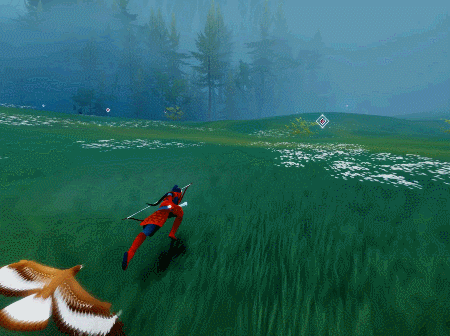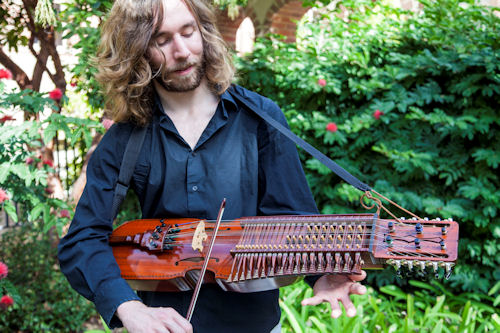The Music of The Pathless:
Finding the Soul of the Score
By Austin Wintory, Composer
I never do this. This will be a series of blog posts about a score as I’m writing it, which is something I would normally avoid like the plague. But this is a chance to try something new and expose the creative process mid-stream. Hopefully it’s interesting! But first, some history …
I had the great pleasure of meeting Matt Nava while working together on Journey from 2009–2012. Matt was thatgamecompany’s Art Director and — as I’ve said many times — his style and aesthetic were the single biggest inspiration for what made Journey’s music what it was (a sentiment we seemed to mutually express). In 2012, he founded Giant Squid and their debut title was ABZÛ. I was again privileged to work with Matt and, in contrast to the stark desolation of Journey, ABZÛ was all about the simultaneously affirmation and stewardship of life. The game doesn’t exactly mask its ecological conservationist subtext, but I always felt it was more of a general celebration of nature.

After the success of ABZÛ, I was very grateful that he again asked me to collaborate with he and Giant Squid. This time, the project is called The Pathless, and it’s quite unlike any of our previous titles. The game focuses on a lone hunter, marooned on an island. Right off the bat, the most immediate difference is the open world nature of it, relative to the linearity of both Journey and ABZÛ. And while ABZÛ was far more lively than Journey, both shared a relatively introspective quality which stands in major contrast to The Pathless’s energetic gameplay. The pacing of the game, and even the animations, are explosive with exuberant rhythm.

Immediately, the challenge was clear: the music had to reflect the lonesomeness of the hunter and the legitimate danger she faces while also encapsulating the joyful nature of the gameplay. As with all of our previous collaborations, this began with trying to find a theme.
This was the first piece I wrote in an effort to accomplish all that, and later a condensed version was used in the reveal trailer.
With that in your ears, here’s how I approached it:
The importance of melody and texture
Games have a wide variety of musical and narrative requirements. When starting a new project, the first thing I tend to do is search for that kernel that forms the basis for everything that will come after. This often manifests as trying to find the perfect theme; that quintessential succession of notes that seem to summarize all of the subtext or even literal nature of the game, its characters, and its story. I am a believer that a great theme — and in particular a great melody — can provide a shortcut into a player’s subconscious and communicate the desires of the game developers in a way that is complementary to, but definitely not overlapping with, the mechanics, art direction, etc.
Matt is certainly a believer in this also. We talked a lot about theme and melody and the way in which it would evolve. The open world nature of the game means that things have to be executed differently this time around (more on that in future posts!) but it is nonetheless a deeply melodic score.
Trying to find the melody
Zeroing in on what exactly that melody should sound like is always the million-dollar question. In this case, there is something ritualistic, or even tribalistic, about the premise of the game. The hunter is dropped off on this island and we slowly absorb her purpose and her traditions. So much is communicated through suggestion and implication, so I want the music to bridge a lot of the gaps in the players’ minds. It should almost feel like a folk song from a culture we’ve never visited and as a result,the melodies should feel as though they are settings of ancient forgotten poems. Even though there are no lyrics, it should feel like a folk song — or even a hymn — from her society. After a week or two of fiddling around, I came up with this melody. It was actually not as difficult as it can sometimes be, and I can only attribute that to how much I’d already fallen in love with this latest Giant Squid world.

The theme, tentatively titled “Pilgrimage”
Choosing the instruments
The next key decision is finding some kind of unique instrument or sound to carry the theme, and indeed to be emblematic of the score as a whole. In the case of ABZÛ, Kristin Naigus’ oboe solos formed the heart and soul of everything, and were an important jumping-off point for most every cue in the game (likewise with Tina Guo’s cello solos in Journey). For The Pathless, I have a slightly different feeling — I want the island to feel simultaneously familiar yet foreign. In a way, it feels like an amalgamation of many different cultures but, in that combination, creates its own. So, any solo instrument that is deeply attached to a specific tradition seemed like it would be misleading. A lot of the times, orchestral instruments can be useful in that situation because the orchestra has been so nearly universally adopted throughout the world that its instruments don’t necessarily evoke the specifics of their European origins anymore (a cello solo like those in Journey doesn’t scream Germany or Italy, etc). At the same time, I wanted something more distinctive, so I decided to form a sort of pan-cultural folk ensemble.

The lead instrument of this is a Nyckelharpa, played by Morgan O’Shaughnessey (who you can hear in the trailer). The Nyckelharpa comes from Sweden and there are remarkably few people who play it. I tend to think of it like a steampunk violin, and can be simultaneously beautiful and incredibly violent and aggressive. Juxtaposed with that are instruments like the Turkish Oud, and a wide range of Eastern flutes and reeds. The list is actually far deeper than that, but I will cover that in subsequent posts. The other equally important soul of the score is the Tuvan ensemble called Alash. Throat singing and the instruments they play form a genetic strand that threads its way across every moment of the game. More on that later!
The reveal trailer below shows how I blended all of that with a simple orchestral palette consisting mostly of strings, percussion, and low winds. It has already been two years (as of this writing) since I composed it, and the score has evolved a lot. Part of the idea of this blog is to share insights of the score in-progress in a way that I am not accustomed to doing. You are hearing a snapshot of my conception for The Pathless from two years ago, so forgive my self-consciousness! More to come…